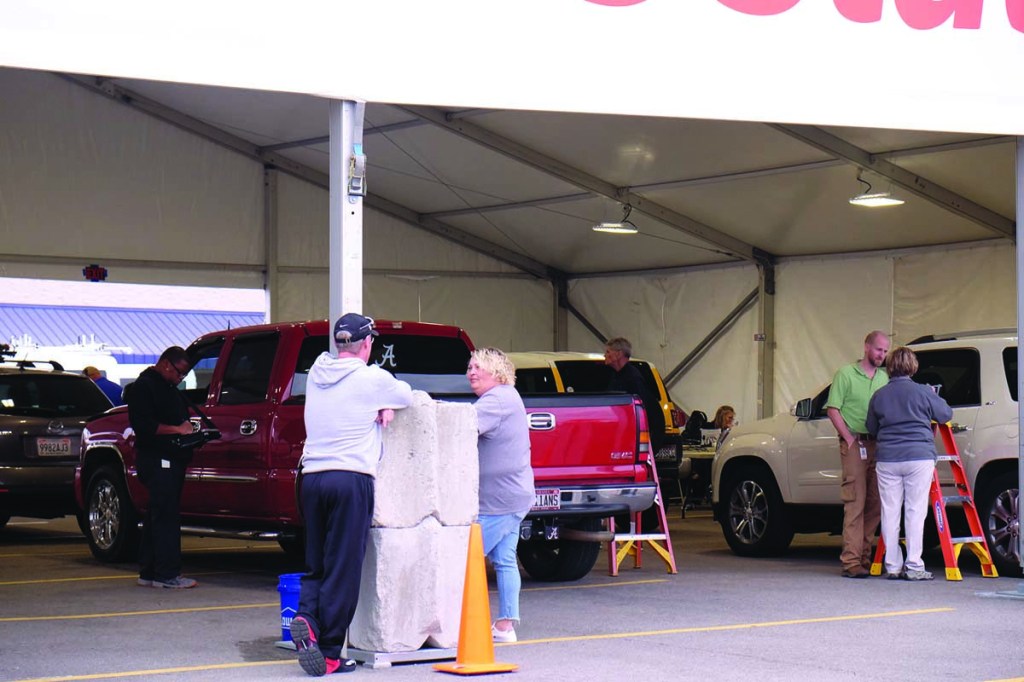Adding up costs: Hailstorm damage to top millions of dollars
Published 6:00 am Sunday, March 25, 2018

- A temporary State Farm service center allows residents to deal with claims after last week's hailstorm.
An army of insurance agents and adjusters have descended upon Cullman County in response to last week’s historic hail storm, tallying up easily millions of dollars in private property and public infrastructure damage.
For many insurance agents, it’s been a non-stop stream of claims to file for homes and vehicles damaged by baseball-sized hail that is extremely rare for the region. While out-of-state contractors have already set up camp in Cullman County, insurance companies urge policy holders to be patient to avoid being scammed.
The true cost of the hail storm could become clearer for local officials by the end of next week, said Cullman County EMA Director Phyllis Little.
“We’re going to add everything up and then those numbers will be combined with the damage estimates in Jacksonville and elsewhere in the state and turned over to the governor,” she said. “She’ll be the one to decide whether to request a federal declaration which would provide money for public infrastructure.”
The American Red Cross reports 520-plus homes were damaged by hail, with another 25-30 businesses closed for repairs and numerous county, city and school facilities and vehicles damaged as well.
“To get individual assistance, at least 50 percent of the damaged homes have to be totally destroyed, and I just don’t think we’re going to get that,” Little said.
Citizens affected by the storm have only private insurance to turn to, and local agents have stayed busy fielding calls and filing claims. State Farm agent Katherine Morgan said her office alone had already taken 330 claims, as of Friday afternoon, with no end in sight.
“State Farm has a mobile unit at Lowe’s where damaged vehicles that are drivable can go through with an adjuster to evaluate the damage,” she said. “Adjusters are also going to door-to-door meeting with policyholders to review damage to homes and vehicles.”
“We have some policy holders who can’t stay in their homes so we’re putting them in hotels until they can find a more semi-permanent solution.”
Residents are urged to be wary of contractors that come to your door offering repairs.
“Ask them if they have your claim number, and if they don’t, then State Farm did not send them,” Morgan said.
Home repair fraud is very common after a major weather event. The National Association of Insurance Commissioners (NAIC) offers these tips to help protect you and your family:
* Get more than one bid from contractors and request at least three references.
* Ask for proof of necessary licenses, building permits, insurance and bonding.
* Record the contractor’s license plate number and driver’s license number, and then check for any complaints with the Better Business Bureau
* Be wary of contractors who demand up-front payment for repairs. Ask for references and verify contractors are legitimate.
“Damage like this usually has a trickle down affect where more leaks and signs of damage show up later so we’re asking policy holders to continue to monitor for damage and report it to us,” Morgan said.
Document damage by taking photographs/video before you begin any clean-up. After you’ve documented the damage, make repairs necessary to prevent further harm to your property (cover broken windows, leaking roofs and damaged walls).
Don’t make permanent repairs until your insurer has inspected the property and you have reached an agreement on the cost. Be prepared to provide the claims adjuster with records of any improvements you made prior to the damage. Save all receipts, including those from temporary fixes.
Work with your insurer to learn what documents, forms and data you need for your claim. Keep a diary of all conversations you have with the insurer and your insurance agent, including names, times and dates of the calls or visits, and contact details. Provide your insurer with all of the requested information, as incorrect or incomplete information may delay your claim.
If the first offer made by the insurer does not meet your expectations, be prepared to negotiate. If there is a disagreement about the claim, ask the insurer for the specific language in the policy and determine why you and the insurer interpret your policy differently. If you believe you are being treated unfairly, contact the Alabama Department of Insurance at 334-269-3550
Tiffeny Owens can be reached at 256-734-2131, ext. 135.


